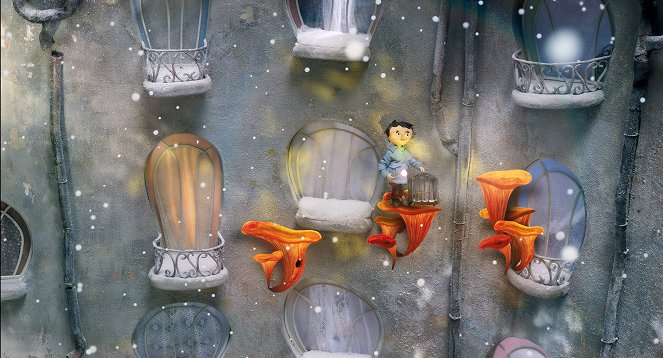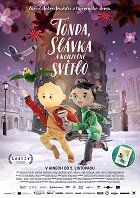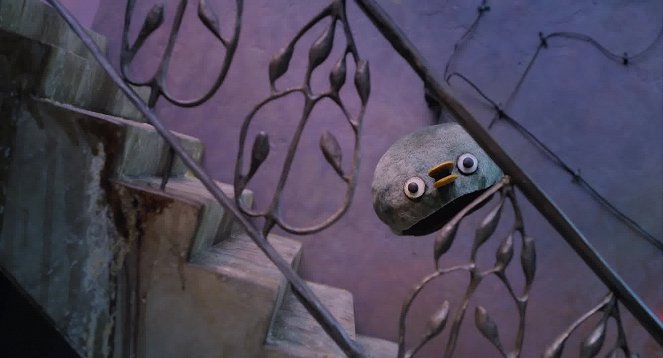Réalisation:
Filip PošivačScénario:
Jana ŠrámkováPhotographie:
Denisa BuranováMusique:
Ádám BalázsActeurs·trices:
Michael Polák, Antonie Barešová, Ivana Uhlířová, Matěj Hádek, Jana Plodková, Pavel Nový, Jaroslav Plesl, Sabina Remundová, Eva Holubová (plus)Résumés(1)
Tonda is not an ordinary boy; he's been shining since birth. Ashamed of this, and because his parents do not let him go anywhere, he prefers to spend all his time in his room. When Slávka, a girl with glasses and a “magic” flashlight, moves into the building, he doesn't trust her at first. Eventually, it turns out that the two may understand each other and that they might also unravel the secrets of the old apartment building. Is there some kind of monster, or is it a ghost running through the corridors and terrifying everyone? Why can only the old janitor talk to it? The poetic, visually captivating film using stop animation shows that one can deal with otherness in any form and that tolerance and responsibility are cards that one can always play, especially at a time when the ideals of tolerance, justice, and compassion are in doubt. (Zlín Film Festival)
(plus)Vidéo (5)
Critiques (2)
Un film familial d'animation capable de toucher autant les enfants que le public adulte et qui traite de l'amitié entre un garçon lumineux et une fille pleine d'imagination vivant dans un immeuble, reflet d'une société confrontée à l'avidité, à l'anxiété et à l'incapacité d'écouter. Il aborde en profondeur le thème de l'acceptation de la différence et montre de manière sensible comment la compréhension mutuelle et le partage, malgré les différences, peuvent vous aider à vous accepter vous-même avec beaucoup plus de confiance. Le film transmet de précieuses leçons sans avoir besoin de tout expliquer littéralement et mélange des éléments de fantaisie magique avec les difficultés réelles de l'adolescence et de la parentalité, ainsi que des allusions à d'autres sujets sérieux, sans perdre pour autant son charme féerique éclatant. De plus, il travaille magnifiquement et consciemment avec les couleurs et la lumière.
()
Czech (and Slovak) animation has again risen to the world-class level in recent years. This has most recently been confirmed by the Czech-Slovak-Hungarian stop-motion film Tony, Shelly and the Magic Light, which received an award at the Annecy International Animation Film Festival. Thanks to its amazing colours, lights (!) and original visual ideas, Filip Pošivač’s feature-length debut looks so good that I wanted to slowly pause every shot and savour it for a moment. In terms of its superb craftsmanship alone (for example, Denisa Buranová’s dynamic cinematography, which takes something from live-action filmmaking and contributes to the originality of the creative concept), this is an extraordinary film in which it never once seemed to me that the filmmakers made any compromises, let alone skimped on anything. And the story, written by Jana Šrámková, is also exceptional, not only in the domestic context, in the way that it is both comprehensible for children (judging from their reactions) and appealing to adults on a deeper level as it tells the story of the little big adventure of an eleven-year-old boy who glows. Since this film has quite a few thematic levels (depression, parenthood, self-realisation), you may find a different key to interpreting it, but for me the main thing was the unusually sensitive (and extremely relatable) narrative about the experience of a child who is neurodivergent (or simply different in some way) and – despite his loving, hyper-protective parents – tries to find his place in society, which is represented in the film by a single multi-storey apartment building. Based on the example of the titular duo, the film shows that it is quite beneficial to meet people or at least one person with whom you can identify (Tony is the only one who can see Shelly’s imaginings) and accept yourself in your own differentness to such a degree that you gain the courage to step outside of your own private (fantasy) world and to share with others your own inner light, which you had long seen as a limitation. Some have the good fortune to do that when they are eleven, some when they are twenty-nine. A beautiful film.
()
Photos (17)
Photo © nutprodukcia



Annonces